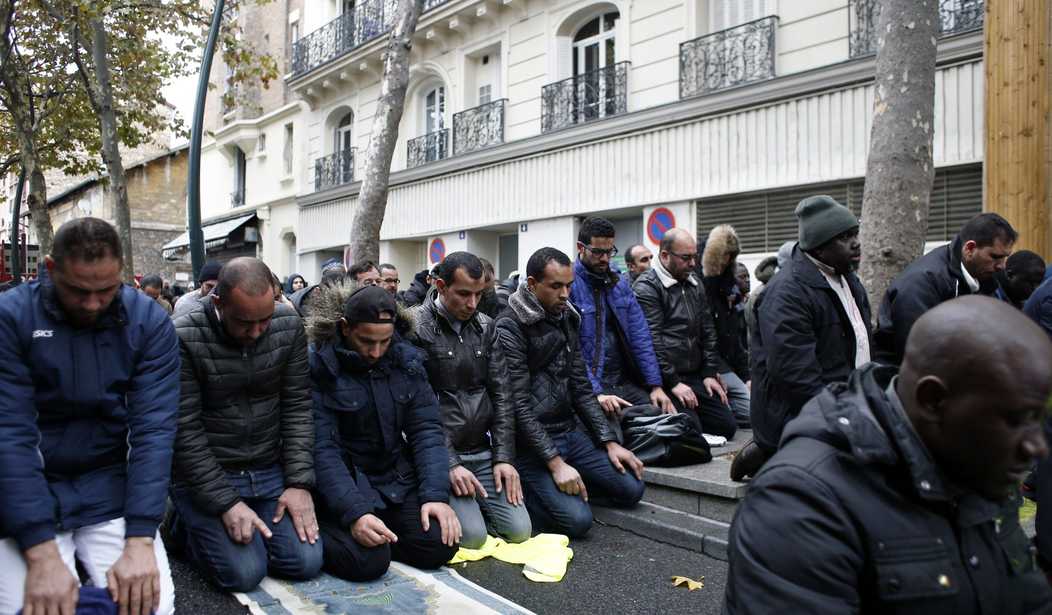Editor’s note: PJM contributor Raymond Ibrahim’s book, Sword and Scimitar: Fourteen Centuries of War between Islam and the West, was recently translated into French and released in France. Arnaud Imatz of the French magazine La Nef interviewed him about it (online version here). The full English version of that interview follows (a much shorter version appears here).
——-
The American Raymond Ibrahim has just published a fascinating and erudite history of the centuries-old conflicts between Islam and Christianity: L’épée et le cimeterre (Jean-Cyrille Godefroy Editions). This book is the almost exhaustive account of the fourteen centuries of antagonisms and fights, major or minor, which took place since Yarmuk (636), until the end of the Barbaresque wars (1830), through the famous battles of Guadalete (711), Poitiers-Tours (732), Manzikert (1071), Hattin (1187), Las Navas de Tolosa (1212), Koulikovo (1380), Constantinople (1453), Malta (1565), Lepanto (1571) and Vienna (1683).

A historian, linguist and philologist, and a specialist in oriental languages, Ibrahim has methodically exploited first-hand sources, both Muslim and “Western”, and has consulted numerous manuscripts from the Library of Congress in Washington. His book is not only a detailed chronicle of the battles, it is also and above all a rigorous analysis of the intentions and strategies of the various warring leaders. Ibrahim shows that the Muslim forces were essentially obeying a religious, messianic, expansionist, conquering logic, whereas the Christian armies wanted above all to recover territories that for centuries had been Roman, Greek and Christian. He also shows that the religious fervor of today’s Islamists overlaps exactly with ancestral Islamic dogmas, that Western reactions are 1400-year-old self-defense mechanisms, and that current rivalries are the reflection of a very old existential struggle. We interviewed him for La Nef.
La Nef: Is the hostility between Islam and Christianity an accident of history or is it part of the continuity of Islamic history?
Ibrahim: It is most certainly part of a continuum. The problem is that modern historians tend to sideline this religious aspect, and focus instead on national identities. For example, we know that for centuries, a great array of “Eastern” peoples invaded and sometimes conquered portions of Christendom. Modern historians give them a variety of names—including Arabs, Moors, Berbers, Turks, and Tatars; other times they are called Umayyads, Abbasids, Seljuks, Ottomans, etc. What modern historians fail to do, however, is point out that all these groups relied on the same exact jihadist logic and rhetoric that contemporary terrorist groups such as the Islamic State do today. Whether it was the Arabs (or “Saracens”) who first invaded Christendom in the seventh century, or the Turks and Tatars who terrorized Eastern Europe into the eighteenth century—all of them justified their invasions by citing Islamic teaching, namely, that it is Islam’s “destiny” to rule the whole world through the means of jihad. They also followed the classical juridical injunctions of, for example, offering the “infidels” three choices before battle—conversion to Islam, acceptance of dhimmi status and payment of tribute (jizya), or death. And, once they conquered a Christian area, they immediately destroyed or transformed churches into mosques, and sold whichever Christians were not slaughtered into abject, and often sexual, slavery.
The degree to which the modern West fails to realize this is evident in its claim that groups like the Islamic State are not behaving according to Islamic teaching and doctrine. In fact, not only are they acting in strict accordance with Islam’s traditional worldview—hating, combating, killing and enslaving infidels—but they often intentionally emulate the great jihadists of history (such as Khalid bin al-Walid, the “Sword of Allah”) whom the West tends to know nothing about.
La Nef: In your opinion, the term “West” masks the real history because it suggests that the “Eastern” and North African lands conquered by Islam (Syria, Egypt, Asia Minor, North Africa), that is to say two thirds of the original Christian territories, were not really part of the Greco-Roman Christian heritage, contrary to what is usually said of the Christian regions of the Balkans or Hispania. Why do we always refer to the Byzantine Empire and never to the Greek-Roman Christian Empire?
Ibrahim: Yes, just as post-Christian Europe and its offshoots (America, Australia, etc.) fail to understand Islam’s true history, so too do they fail to understand their own true history—especially as impacted by Islam. What is now referred to as “the West” was for centuries known and demarcated by the territorial extent of its religion (hence the older and historically more accurate term, “Christendom”). It included all the lands you mention and more; they had become Christian, many centuries before Islam arrived and were part of the same overarching civilization. Then Islam came and violently conquered the majority of those territories, some permanently (the Middle East, North Africa, Anatolia), some temporarily (Spain, the Balkans, the Mediterranean islands). During this time, most of Europe became the last and most redoubtable bastion of Christendom not to be conquered though constantly attacked by Islam. In this (forgotten) sense, the term “the West” becomes ironically accurate. For the West was actually and literally the westernmost remnant of what was a much more extensive civilizational block that Islam permanently severed. Overall, however, the term “the West” shortchanges its own history with and truncation by Islam. It further implies that all those “Eastern” lands conquered by Islam were never part of “Western civilization,” when in fact they were the original inheritors of its Greco-Roman and Christian heritage.
Which leads to the so-called “Byzantine Empire.” In 330, Roman emperor Constantine the Great built a new capital for the empire, which he named “New Rome” (though it was later dubbed Constantinople in his honor). Although it was profoundly Christian; although it was Old Rome’s direct successor and survived the former’s fall by a thousand years; although everyone, friend and foe, called it “Roman”; and although it was Christendom’s easternmost bulwark against Islam for centuries, since 1857 it has been known as “Byzantium”—another neologism that severs the continuity and significance of the post-Christian West’s own history and heritage.

Collectively, all these terms—“the West,” “Byzantium,” etc.—do one thing: they remove the “C” word—Christianity—from the consciousness of the descendants of those who fought and died for it. They are part of the same trend that has supplanted terms such as B.C. (Before Christ) with B.C.E. (Before the Common Era)—even as one wonders in vain what differentiates the so-called “common era” from what came before it, other than Christ.
La Nef: The battle of Manzikert, which was for the Turks what Yarmuz was for the Arabs, is celebrated as a great victory of Islam by Erdogan and Turkish dignitaries. On the other hand, the leaders of countries like France and Spain prefer to ignore or underestimate the historical importance of Tours-Poitiers or Las Navas de Tolosa. Many French scholars no longer consider the battle of Poitiers-Tour (732) as a “turning point” but rather as a “minor raid episode”. Should we see in this attitude signs of the revival of fighting Islam and, conversely, of European pacifism and renunciation?
Ibrahim: Yes, you should most certainly see this, because that is precisely what these attitudes signify. But I would argue that, for the European elite, the matter is worse than merely “downplaying” their ancestors’ defensive victories against Islam. Some are actively condemning them. For a growing number of Spaniards, for example, the Reconquista—centuries of warfare to liberate Spain from Islam—is a source of shame, a reminder of how “intolerant” and “backwards” their forbears were, particularly vis-à-vis the supposedly “tolerant” and “advanced” Muslims of al-Andalus. In reality, the shame such elites have for their ancestors, and the praise they have for their ancestors’ enemies, is indicative of the degree to which they have been indoctrinated in a “history” that is antithetical to reality.
La Nef: You write that the Crusades had a decisive influence on subsequent events and that “even the voyages of Christopher Columbus were motivated by the desire to recapture Jerusalem”. Why?
Ibrahim: Hostile Islam so overwhelmed and surrounded Europe that there were few aspects of life not to be impacted by it—including, for example, travel and trade. Because Islam (under the Ottomans and Mamelukes) dominated the eastern Mediterranean—killing or enslaving any Christian foolhardy enough to come near—Columbus opted to find another route to get to the East; others, like the Portuguese, sailed all around Africa to get to Asia. But even the motives for Columbus’s voyages are less “romantic” than depicted in schoolrooms: he was searching for potential allies to help in the long war against Islam, including by liberating Jerusalem. In this sense, even the voyager Columbus was a crusader against Islam—just as many other European travelers before him were, particularly in the context of the centuries-long search for Prester John, a fabulously strong Christian monarch living somewhere beyond the eastern borders of Islam. If they could only reach this legendary figure, it was believed, he would come and help the Europeans against Islam.
La Nef: Is the doctrine of taqiyya, which traditionally defines how Islam should function under non-Muslim rule, outdated today or still relevant?
Ibrahim: Taqiyya—which permits Muslims to fool non-Muslims by, for instance, pretending to disavow jihad, or even to apostatize from Islam and convert to Christianity—is still very much relevant today. As the late Dr. Sami Nassib Makarem, the foremost authority on taqiyya, wrote in his seminal book, Al-Taqiyya fi’l Islam (“Taqiyya in Islam”): “Taqiyya is of fundamental importance in Islam. Practically every Islamic sect agrees to it and practices it … We can go so far as to say that the practice of taqiyya is mainstream in Islam, and that those few sects not practicing it diverge from the mainstream … Taqiyya is very prevalent in Islamic politics, especially in the modern era [emphasis added].”
La Nef: The feeling of Christian solidarity has disappeared nowadays not only among European politicians and chancelleries but more generally in public opinion. What about Muslims who know the history of Islam? Do they consider the concept of jihad against the infidels to be an integral part of Islam?
Related: France Learns about Islam’s 1,400 Year Assault
Ibrahim: Yes they do, certainly the ones learned in history—and the average Muslim is by far much more learned in Islamic history than the average European is in their own history. Worse and as mentioned, Europeans tend to be “learned”—that is, indoctrinated—in false histories, ones designed to demonize their past and heritage, while whitewashing the past and heritage of others, in this case, Muslims. Jihad against infidels is indeed an integral part of Islam, documented and validated everywhere—in the Koran, hadith (and subsequently Sunna), and the consensus of the umma. No authoritative Muslim cleric (or ‘alim, singular for ‘ulema—“they who know”) past or present, has ever denied this—except, of course, when speaking before “infidel” audiences and practicing taqiyya.
La Nef: Is the community of Muslims, the umma, nowadays totally divided or relatively united?
Ibrahim: They are, of course, physically divided into what some criticize as artificial nation states established by colonial powers. That said, many Muslims share a certain amount of “tribalism” with other Muslims—meaning they may prefer the company of another Muslim of whatever race, than the company of an infidel of even their own race (in keeping with the doctrine of al-wala’ w’al bara’ (or “loyalty and enmity”). Dreams of reunification under a caliphate are also common and regularly expressed by every segment of society—from the Islamic State, to the Turkish president, and of course among the average Muslim on the street. Whether such a reunification is realistic and realizable is another matter.
La Nef: Are the “militant”, “extremist” or “Islamist” Muslims faithful to Islam or are they holding it hostage to their own political interests?
Ibrahim: The bottom line is this: there is hardly anything that these types of Muslims do that is not already part of their religion and heritage. For example, all the depravities the Islamic State engaged in—enslaving, selling, and buying infidel “sex slaves”; beheading, crucifying, and even burning infidels alive; destroying or turning churches into mosques—were committed countless times over the centuries by Muslims, always in the name of jihad. Such depravities are, moreover, defined as at least “permissible” (when not obligatory) in Islamic law. How then can we call such Muslims “militant” and “extreme”? Seems more logical to call Islam itself “militant” and “extreme,” no?
Moreover, the argument that these types of Muslims do such things because they are “holding Islam hostage to their own political interests” is irrelevant: From the very start, beginning with Muhammad himself, Islam was always used—and arguably “designed”—for political interests. As one example, after proclaiming that Allah had permitted Muslims four wives and unlimited concubines (Koran 4:3), Muhammad later declared that Allah had delivered a new revelation (Koran 33:50–52) offering him, the prophet alone, a dispensation to sleep with and marry as many women as he wanted—prompting his child-bride Aisha to quip, “I feel that your Lord hastens in fulfilling your wishes and desires” (narrated in Sahih Bukhari 6:60:311).
La Nef: The communitization of French society is now a widely accepted fact. In spite of the warnings of prestigious “alarmists” such as Malraux, Ellul, Lévi-Strauss or more recently Houellebecq, to name but a few, the French elites have been betting for more than fifty years on the emergence of a “new Islam, modernized, reformed, open, contextualized, secularized, democratized”, compatible with the Western model, which would make it possible to marginalize the “small fundamentalist minority that is the breeding ground of Islamist terrorism”. Is such an Islam possible? Are lasting arrangements and compromises realistic or are they the result of angelism (naïve optimism)?
Ibrahim: Such a “Westernized” Islam, were it ever to come into being, would by necessity have so little to do with authentic Islam that it would be intellectually dishonest to associate it with—let alone call it—“Islam.” The bottom line is that the essential teachings of Islam were promulgated by a seventh century Arab—who thought and acted precisely as one would expect a seventh century Arab to think and act, meaning draconically and even barbarously. The teachings of Islam—including hating and when convenient warring on infidels, ostracizing or killing apostates, subjugating religious minorities, and a host of misogynistic measures—are inherently not “modernized, reformed, open, contextualized, secularized, or democratized.” In short, shari‘a, that sacred body of Islamic teachings, is by definition not only not “compatible with the Western model”; it is the antithesis of the Western model.
This, of course, is not to say that individual Muslims cannot be secular, reformed, etc. It is simply to say that, if they are—and good for them—that is because they are ignoring the teachings of Islam. For Islam to conform to the Western model is for it to become something entirely unrecognizable from itself.












Join the conversation as a VIP Member